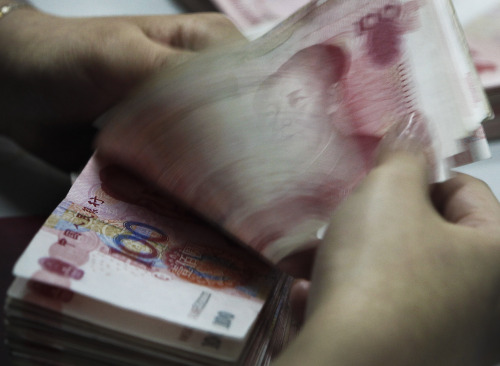China may deflect international pressure for faster yuan appreciation by reporting the nation’s smallest trade surplus in 10 months tomorrow.
The excess was $4.9 billion in February, from $6.5 billion a month earlier, according to the median estimate in a Bloomberg News survey of 21 economists. Data for the first two months of the year is typically distorted by the timing of a Lunar New Year holiday.
A smaller surplus may support China’s contention that the world’s second-largest economy is moving toward balanced trade as imports climb. Commerce Minister Chen Deming said March 7 that it’s “totally unreasonable” to say the yuan is undervalued, rejecting renewed calls by U.S. Treasury Secretary Timothy Geithner for faster gains.
“The smaller surplus in the last three months, combined with the trend we saw in the last two years, shows China’s rebalancing efforts are working,” said Sun Chi, a Hong Kong- based economist at Nomura Holdings Inc. who previously worked for the U.S. Treasury in Beijing. “It will also alleviate the pressure for yuan gains.”
Economists combine Chinese data for the first two months of the year to eliminate distortions. On that basis, the surplus may be $11 billion, about half the amount a year earlier. The boost to imports from higher commodity costs is playing a role, Sun said.
 |
A bank clerk counts Chinese currency notes in Beijing. (AP-Yonhap News) |
Premier Wen Jiabao highlighted efforts to boost domestic demand as a “long-term strategic principle” in his annual report to the legislature in Beijing on March 5.
Exports may have climbed an annual 27 percent in February, with imports rising 33 percent, the survey showed.
The yuan dropped 0.1 percent to 6.5720 per dollar in Shanghai as of 9:44 a.m. Non-deliverable forwards traded at 6.4155, reflecting bets the currency will strengthen 2.4 percent in a year.
“While seasonal adjustment is tricky at this time of the year, the typical pattern will be for the trade surplus to rebound after narrowing early in the year,” said David Cohen, a Singapore-based economist for Action Economics who has previously worked for the U.S. Federal Reserve. The annual surplus may be about $160 billion, down from $183 billion last year, he estimated.
That level will “still leave pressure for yuan appreciation,” he added.
China may report trade deficits in some months this year, Chen said at the National People’s Congress in Beijing on March 7. That has only happened once in the past six years, in March 2010.
The commerce minister also said that the yuan will appreciate gradually over the long term, adding that basic stability in the currency aids the global recovery.
Some U.S. lawmakers, including Senator Charles Schumer of New York, complain China is holding down the yuan’s value to give its exporters an unfair advantage over American rivals. China is the world’s No. 1 exporting nation by value of shipments.
Chinese companies can accept annual gains in the currency of 3 percent to 5 percent, Bank of China Ltd. President Li Lihui said at the Beijing congress on March 5. Central bank Deputy Governor Yi Gang said the same day that the yuan’s exchange rate is the closest it has been to “equilibrium.”
China is “committed” to moving to a market-determined, flexible exchange rate and understands the importance of allowing the yuan to appreciate, the International Monetary Fund’s Zhu Min said on March 7. “The only question remaining is the speed,” Zhu, a special adviser to the IMF and a former Chinese central bank deputy governor, said in Arlington, Virginia.
(Bloomberg)








